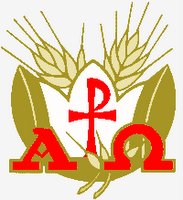 The first day of November (or a Sunday close to it) is traditionally observed as All Saints' Day. On this day the Church — particularly Western Christendom — remembers those who have finished the course of this life in faith and are now at rest with the Lord.
The first day of November (or a Sunday close to it) is traditionally observed as All Saints' Day. On this day the Church — particularly Western Christendom — remembers those who have finished the course of this life in faith and are now at rest with the Lord.On All Saints' Day, we thank God for the faith of our fellow saints and for their example in the Christian life. But most of all, we praise God for His faithfulness to His saints, keeping them in His merciful favor. God promises to be faithful to us just as He has been faithful to our fellow saints before us.
The day came about in large part because of a glut of canonized saints, including many of the martyrs of the early centuries, in the Roman Catholic Church. So many had been established that the calendar overflowed with saints' days. Therefore, the Church combined many of the "lesser" saints and moved them to the joint commemoration we still celebrate on 1 November.
Lection
Psalm 149
Revelation 7:2-17
1 John 3:1-3
Matthew 5:1-12
Collect
Almighty and everlasting God, You knit together Your faithful people of all times and places into one holy communion, the mystical body of Your Son, Jesus Christ. Grant us so to follow Your blessed saints in all virtuous and godly living that, together with them, we may come to the unspeakable joys You have prepared for those who love You; through Jesus Christ, our Lord, who lives and reigns with You and the Holy Spirit, one God, now and forever.
Technorati Tags: All Saints' Day | Festival of All Saints | Feast of All Saints | saints | martyrdom | sainthood | martyrs | heaven | eternal life | Church Year | liturgical calendar | Christianity | Christian | Lutheranism | Lutheran | feasts | festivals | saints' days | biography | hagiography | commemorations | lectionary | theology | practical theology | historical theology | Church history | Christian history | Aardvark Alley
Here's a four and a quarter minute video collage of people, events, and items from the period of the Reformation, set to the tune Ein Feste Burg.
Remember to check the 95 Theses Rap for a more light-hearted and slightly less historical view.
HT: Veith
Technorati Tags: Reformation | Reformation Day | Lutheran Reformation | Martin Luther | A Mighty Fortress Is Our God | Ein Feste Burg | Wittenberg | Germany | Saxony | history | Church Year | liturgical calendar | Christianity | orthodox Christianity | Christian | Lutheranism | Lutheran | confessional Lutheran | Lutheran orthodoxy | festivals | saints' days | biography | hagiography | commemorations | lectionary | theology | historical theology | Church history | Christian history | practical theology | Church music | hymnody | Aardvark Alley
 The beginnings of the Reformation came well before its birth date. Renaissance Humanism ushered in an age of classical studies, including the teaching of Greek and Hebrew. This paved the way for in-depth study of the Scriptures in their original languages. Theological errors and moral abuses were rife in the Western Church and certain individuals had already been moved to challenge and resist these errors.
The beginnings of the Reformation came well before its birth date. Renaissance Humanism ushered in an age of classical studies, including the teaching of Greek and Hebrew. This paved the way for in-depth study of the Scriptures in their original languages. Theological errors and moral abuses were rife in the Western Church and certain individuals had already been moved to challenge and resist these errors.By the time Martin Luther was born, John Hus and Girolamo Savonarola had been killed for their efforts at reform and the remains of John Wycliffe had been exhumed and burned. Wycliffe and Hus, especially, tried to bring the Bible into the vernacular. Nationalism and territorial pride, pressure from the Turks, and a general restlessness all joined into making the early 16th Century a time to foment change — even violent change and revolt.
Into this mix stepped Augustinian friar and university professor Martin Luther. Stricken for years by an active conscience and a false understanding of Jesus Christ as a terrible judge, he was driven to the Scriptures by the work of the Holy Spirit, especially through the strong but gentle guidance of Johann von Staupitz. His studies led him to the understanding that grace, not wrath, is Scripture's central theme and that justification by grace through faith in Christ is Christianity's cardinal doctrine.
As he began looking without himself more than within, Luther saw that his misunderstanding of the Gospel came not only from inside, by the resistance of his Old Adam to God's Word. Instead, he more clearly perceived how far from Scripture many teachings and practices were. Therefore, he resolved to address certain abuses based upon his enlightened understanding. Triggered by the sale of indulgences by Johann Tetzel, he composed ninety-five topics for theological debate, many of which focused directly on matters of God's grace versus human works.
 Luther's prince, Elector Frederick III of Saxony, didn't involve himself in crassly selling escape from punishment after death. However, he did have a large collection of religious relics which he would display annually on the Feast of All Saints. People would come to view them, trusting that looking, praying, and leaving an offering would greatly reduce the time they would spend in Purgatory following their deaths.
Luther's prince, Elector Frederick III of Saxony, didn't involve himself in crassly selling escape from punishment after death. However, he did have a large collection of religious relics which he would display annually on the Feast of All Saints. People would come to view them, trusting that looking, praying, and leaving an offering would greatly reduce the time they would spend in Purgatory following their deaths.According to many contemporary sources, Luther took his debate topics to the community's main bulletin board, the doors of Wittenberg's castle church, on All Hallows' Eve and nailed his 95 Theses to them. On the same day, he mailed copies to friends, other universities, the Archbishop of Mainz, and the pope.
Luther apparently intended for the initial discussion to take place within the confines of the Church, especially among trained theologians and academics. Therefore, he wrote them in Latin, the Church's official language of teaching and communication. This intent was thwarted by others — printers sensed a huge story and quickly translated, published, and widely disseminated them so their content soon became also food for the common people's thoughts.
Luther never intended to foster a revolt or to found a new church; both happened because his teaching on salvation was so at odds with the organized church. As noted above, this theological fault line then felt other forces, including nationalism's increasing resistance to foreign popes and emperors. With all these pressures, the fracture between the followers of Luther and those who clung to Roman Catholic dogma widened. The pope excommunicated Luther and the break was complete. He who'd hoped to clean up the mess clinging to his mother church was forced instead to continue his life, studies, and exercises of the Faith in a new, Evangelical confession that later became known as Lutheranism.
The Reformation spread through much of Northern and Western Europe and Evangelical Christianity largely filled Germany and Scandinavia. Subsequent wars and treaties later shifted some of the boundaries. However, the basic division from Luther's day remains in Europe. Following the ejection of the Lutheran party from the Roman Catholic Church, others who disagreed with Rome began their own Reformation movement.
Some joined the Lutherans for a time but later split over doctrine. Later, some of these splintered into still other bodies. England, which was protected by water from threats of force, had a bit of direct Lutheran influence, particularly through Robert Barnes. However, the English Reformation began following other teachings and soon went its own way. Soon, this English (Anglican) Reformation also divided for both doctrinal and political reasons.
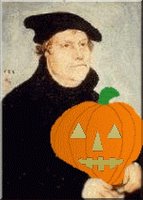 Since it began with Luther, and since Lutherans were the original Protestants, we traditionally celebrate the day with more zeal than does any other part of Christendom. Our annual commemorations may carry a strong, positive influence, reminding us of the core reason why it all happened: Martin Luther, convinced that the saving Gospel of Jesus Christ was being obscured by legalism and empty, unchristian ceremonialism, restored the doctrine of justification to its central position. Therefore, gathering to receive and confess salvation by grace through faith in Christ marks such celebrations as good.
Since it began with Luther, and since Lutherans were the original Protestants, we traditionally celebrate the day with more zeal than does any other part of Christendom. Our annual commemorations may carry a strong, positive influence, reminding us of the core reason why it all happened: Martin Luther, convinced that the saving Gospel of Jesus Christ was being obscured by legalism and empty, unchristian ceremonialism, restored the doctrine of justification to its central position. Therefore, gathering to receive and confess salvation by grace through faith in Christ marks such celebrations as good.However, when we use the the day to bash Catholicism, to boast upon ourselves, to almost worship Luther, or to attack other believers in a mean and petty fashion, we ignore our heritage and risk returning to the legalistic bondage from which the the Reformation brought escape. Also, we misunderstand both the purpose and the methods of the Luther's Reformation if we callously reject and stray from the ancient and good ceremonies and traditions that the reformers kept, just because some think of them as being "too old-fashioned" or "too Catholic." Luther sought no novelty. He wanted to restore the centrality of God's grace in Christ Jesus to the Church rather than radically altering her theology and practice.
Regarding what is often called the "Luther Rose," Martin Luther said of the emblem he chose for himself, "I shall ... tell you my original thoughts and reason about why my seal is a symbol of my theology. The first should be a black cross in a heart, which retains its natural color, so that I myself would be reminded that faith in the Crucified saves us. 'For one who believes from the heart will be justified' (Rom. 10:10). Although it is indeed a black cross, which mortifies and which should also cause pain, it leaves the heart in its natural color. It does not corrupt nature, that is, it does not kill but keeps alive. 'The just shall live by faith' (Rom. 1:17) but by faith in the crucified.
"Such a heart should stand in the middle of a white rose, to show that faith gives joy, comfort, and peace. In other words, it places the believer into a white, joyous rose, for this faith does not give peace and joy like the world gives (John 14:27). That is why the rose should be white and not red, for white is the color of the spirits and the angels (cf. Matthew 28:3; John 20:12).
"Such a rose should stand in a sky-blue field, symbolizing that such joy in spirit and faith is a beginning of the heavenly future joy, which begins already, but is grasped in hope, not yet revealed. And around this field is a golden ring, symbolizing that such blessedness in Heaven lasts forever and has no end. Such blessedness is exquisite, beyond all joy and goods, just as gold is the most valuable, most precious and best metal. This is my compendium theoligae [summary of theology]. I have wanted to show it to you in good friendship, hoping for your appreciation. May Christ, our beloved Lord, be with your spirit until the life hereafter. Amen."
Martin Luther, "Letter to Lazarus Spengler," July 8, 1530, as included in the translation by Amy Marga from "Luthers Siegel: Eine elementare Deutung seiner Theologie," in Luther 67 (1996):66–87. Translation printed in Lutheran Quarterly, Vol. XIV, Num. 4, Winter 2000, pg. 409-410.
The "Reforween" illustration was spurred by a brother pastor in my circuit. He noted that Luther gets the credit for the widespread popularity of the Christmas tree. He figures that with this picture we might also be able to promote a folk belief that he introduced the Halloween jack o' lantern. This could have the collateral benefit of providing our church youth groups with a new source of income, October pumpkin sales.
Lection
Psalm 46
Revelation 14:6-7
Romans 3:19-28
Matthew 11:12-19 or John 8:31-36
Collect
Almighty and gracious Lord, pour out Your Holy Spirit on Your faithful people. Keep us steadfast in Your grace and truth, protect and deliver us in times of temptation, defend us against all enemies, and grant to Your Church Your saving peace; through Jesus Christ, Your Son, our Lord, who lives and reigns with You and the Holy Spirit, one God, now and forever.
Technorati Tags: Reformation | Reformation Day | Lutheran Reformation | Protestant Reformation | Martin Luther | John Wycliffe | John Hus | Girolamo Savonarola | Johannes von Staupitz | Robert Barnes | Johann Tetzel | Renaissance | humanism | Wittenberg | Germany | Saxony | history | Church Year | liturgical calendar | Christianity | orthodox Christianity | Christian | Lutheranism | Lutheran | confessional Lutheran | Lutheran orthodoxy | Evangelical | Protestant | festivals | saints' days | biography | hagiography | commemorations | lectionary | theology | historical theology | Church history | Christian history | Saxon history | German history | European history | Aardvark Alley
Answering the tough question on human life and human rights may be "above [a certain presidential candidate's] pay grade," but it's part of what we call upon our leaders to do. How a person believes and votes on life and sexual-orientation issues is a barometer for other beliefs and an indicator of possible future actions.
I'm no lawyer, just a dirt-scratching aardvark cum parish pastor. However, the legal wonks from The Judeo-Christian View inform us that even when we're dressed in our Sunday- (or Sabbath-) go-to-meeting clothes, "Pastors, rabbis and priests are free under both the Constitution and the tax code to preach Biblical ethics and morality, to name names of politicians, and to explain their public policies to congregants. Despite widespread misreporting and intentional distortion by opponents of religious liberty and free speech, no church has ever lost its tax exempt status for any such activity."
1. Who waffled on rights and protection for the unborn? Who stated categorically that conception begins one's humanity?
2. Should a baby survive an abortion and start drawing breath on his own, which candidate refuses to consider even this child as a rights-endowed citizen?
3. We also elect leaders to promote domestic tranquility, which includes stable families headed by fathers and mothers. Which presidential candidate wants to force the states and individual citizens to accept homosexual "marriages"? Who favors the Defense of Marriage Act?
4. Our elected leaders also provide for the national defense, which includes building and maintaining a strong military and doing everything possible to enhance morale. How would morale be affected if men an women were housed in the same quarters with no special provisions for privacy? Why? How different would it be if we mixed self-avowed homosexuals with heterosexual men and women with the same disregard for privacy?
Again I quote the legal opinion from The Judeo-Christian View: "Email your flock to go now to the website, urging them to see the powerful videos and possibly join you in subscribing. Email in your personal capacity, or as religious leader (either way is fine legally). Contact your flock by auto-dialer, or put a prayer alert on your phone trees. But, by any or all of these means, be a Good Shepherd of your sheep and a Faithful Watchman at the walls (Ezekiel 33, 34)."
Any right- or left-wing feedback? Ministers, have you spoken on politics this year? Will you before next week's elections?
Technorati Tags: United States | U S | U.S. | politics | presidential election | presidency | 2008 | presidential campaign | presidential politics | Barack Obama | Obama | John McCain | McCain | Christian | Jew | Jewish | Judeo-Christian | Judeo-Christian View | church and state | pro-life | abortion | homosexuality | gay marriage | homosexual marriage | Defense of Marriage Act | DOMA | marriage | family | military | YouTube | You Tube | Aardvark Alley
The 95 Theses Rap began as a film project at Yale. Check the site for production information, disclaimers, historical notes and anachronisms, and the like.
Technorati Tags: Reformation | Reformation Day | Lutheran Reformation | Protestant Reformation | Martin Luther | indulgences | Ninety-five Theses | 95 Theses | rap | 95 Theses Rap | Johann Tetzel | Yale University | Bulldog Productions | Peter Shutack Fund for Filmmaking | Lutheranism | Lutheran | Church history | history | humor | music | film | Aardvark Alley
Thus we are introduced to Jewberry, a third-party prayer partner for techno-savvy observant Jews. Taking into account sectarianism and individual preference, the company advertises the availability of Shacharit, Mincha & Maariv (Ashkenaz, Sefard, Eh'M & Ari), Tehillim, Kriat Shma Al Hamitah, Tefilat Haderech, and Bracha Achrona texts. Now I have another
So why should Lutherans be lagging behind? Check the Aardvark's conception of the Wittenberry, preloaded with our essential Lutheran theology, including German and Latin urtexts:

HT: Jeff Trexler's Blingdom of God
Technorati Tags: Blackberry | PDA | davening | daven | prayer | Hebrew | Judaism | confessional Lutheranism | orthodox Lutheranism | Lutheran Confessions | German | Latin | Jewberry | Wittenberry | technology | humor | Christian | Lutheranism | Lutheran | Aardvark Alley
A Prefatory Note: While the Lutheran calendar allows us to translate the celebration of the Reformation to the Sunday preceding the festival, I see no good reason to avoid using today's propers for the feast of these saints. The assigned Scriptures provide powerful readings and outstanding sermonic resources. Heard together and connected by the sermon, the four passages display St. Paul's characterization of God's Word: "All Scripture is breathed out by God and profitable for teaching, for reproof, for correction, and for training in righteousness. (2 Timothy 3:16)"
I have one big caution, however: Pastors who think that they're being ignored or in some way mistreated or threatened by their congregations should be careful with the Jeremiah text. If you preach it to your flock — especially if you need to preach it to your flock — do so with firm resolve but also with overflowing love.
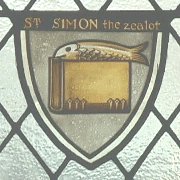 On the various New Testament lists of the Twelve Apostles (Matthew 10:2-4; Mark 3:16-19; Luke 6:14-16; Acts 1:13), the tenth and eleventh places are occupied by Simon the Zealot (or Simon the "Cananean," which is the Aramaic word meaning "Zealot") and by Judas of James, also called Thaddaeus or Lebbaeus.
On the various New Testament lists of the Twelve Apostles (Matthew 10:2-4; Mark 3:16-19; Luke 6:14-16; Acts 1:13), the tenth and eleventh places are occupied by Simon the Zealot (or Simon the "Cananean," which is the Aramaic word meaning "Zealot") and by Judas of James, also called Thaddaeus or Lebbaeus.Simon is not mentioned by name in the New Testament except on these lists. If he was of the Jewish religio-political organization known as the Zealots, he would have been part of an effort to overthrow Roman rule. However, the title might only be descriptive of his personality.
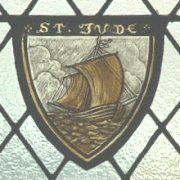 Judas (often called Jude in English) is variously named, but this is not surprising. Before the Crucifixion, there would be a need to distinguish him among the apostles from Judas Iscariot, and after the Crucifixion there would be an additional reason for being emphatic about the distinction.
Judas (often called Jude in English) is variously named, but this is not surprising. Before the Crucifixion, there would be a need to distinguish him among the apostles from Judas Iscariot, and after the Crucifixion there would be an additional reason for being emphatic about the distinction.After the Last Supper it was Jude who asked Our Lord why he chose to reveal Himself only to the disciples. He received the reply: "If anyone loves me, he will keep my word, and my Father will love him, and we will come to him and make our home with him. (see John 14:22-31)"
As misguided Christians began to invoke the saints, the apostles became particularly popular targets for their petitions. Since little was known about Jude and because his name was forever tied to the betrayer, people wouldn't pray to him until they'd exhausted all other resources. This led to his being titled the "Saint of Last Resort," since he was the last saint remaining.
Jude enjoys several patronages, the most notable being lost or desperate causes. Perhaps being the last resort played into this, but more likely the association came because of the encouragement in the Epistle of Jude to remain faithful no matter how harsh the circumstances.
Jude's invocation during desperate situations drew special attention from the sick and injured, especially those "hopeless" who saw no improvement or were close to death. As medicine advance and seriously ill people gathered together for treatment, it was natural to grant patronage of hospitals and hospital workers to the apostle.
The most noted connection in this area is St. Jude Children's Research Hospital. Founder Danny Thomas wanted no child to die at the dawn of life. Recognizing the desperation of families when the children faced critical, life-threatening situations, he also wanted to remind them that as long as life remains and as long as prayers are prayed, we should never give up hope.
Lection
Psalm 43
Jeremiah 26:1-16
1 Peter 1:3-9
John 15:12-21
Collect
Almighty God, You chose Your servants Simon and Jude to be numbered among the glorious company of the apostles. As they were faithful and zealous in their mission, so may we with ardent devotion make know the love and mercy of our Lord and Savior Jesus Christ, who lives and reigns with You and the Holy Spirit, one God, now and forever.
Technorati Tags: Saint Simon | Saint Jude | Thaddaeus | Lebbaeus | St. Simon | St. Jude | Saint Judas | St. Judas | Simon the Zealot | Jesus Christ | Jesus | Christ | Judas Iscariot | St. Paul | apostles | disciples | St. Jude Children's Research Hospital | Danny Thomas | patron saint | patronage | last resort | lost causes | Church Year | liturgical calendar | sanctorial calendar | Christianity | Christian | Lutheran | Lutheranism | Christian feasts | festivals | saints' days | biography | hagiography | commemoration | theology | historical theology | exegetical theology | history | Church history | Christian history | Bible history | biblical history | Bible | Scripture | Gospel | New Testament| Aardvark Alley
 Here we meet three bloggers who examine our response to secular society, the LDS, and the poor and disenfranchised. Each gentleman has different styles of writing but all will challenge your thinking and your (in-) actions. Please peruse these newest additions to the Big Blogroll O' Vark®™©.
Here we meet three bloggers who examine our response to secular society, the LDS, and the poor and disenfranchised. Each gentleman has different styles of writing but all will challenge your thinking and your (in-) actions. Please peruse these newest additions to the Big Blogroll O' Vark®™©.If you're not sure what to make of the BBOV or wonder about the benefits of being listed and of listing others' blogs, please read the first three links under Aurous Effluence in the sidebar. Those who'd like the Big Blogroll O' Vark®™© can either email me or copy the list from the Alley's source code (click View | Page Source or Control+U in Firefox or View | Source in Internet Explorer).
THE LATEST GREATS OF THE BBOV
§ All in Faber entails "politics, theology, astronomy, sports and mores"
§ Mark Cares's Weblog speaks the truth in love to Mormons
§ Mercy Journeys with Pastor Harrison — faith in action
IN CONCLUSION
For all those enrolled in the BBOV, links back are certainly appreciated. And don't forget that all of those listed benefit when you use the entire blogroll. Also, if you'd like to graphically point to the Alley and the Big Blogroll O' Vark®™©, you may use the above design from St. Charles the Illuminous or one of these blog buttons:
Finally, if you own or know of a Lutheran blog demonstrating a quia confessional subscription and would like me to consider it for inclusion, please leave a comment. And again, for more information about why this stuff benefits confessional Lutheran blogging, morality, and other worthwhile endeavors, please check out the first three links under Aurous Effluence in the sidebar.
Technorati Tags: Aardvark Alley | Big Blogroll O' Vark®™© | BBOV | blogroll | blog roll | Lutheran | confessional Lutheran
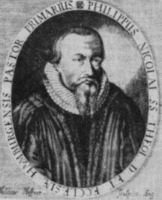 Nicolai was born in Waldeck, Germany 10 August 1556, the son of a Lutheran pastor. He entered the University of Erfurt and in 1576 he went to Wittenberg. For four years after his graduation, he lived at Volkhardinghousen and frequently preached for his father. In 1583, he was appointed Lutheran preacher at Herdecke, but because of a Roman Catholic town council, he found many difficulties there Following an invasion by Spanish troops in April 1586, a colleague re-introduced the Mass and Nicolai resigned his call.
Nicolai was born in Waldeck, Germany 10 August 1556, the son of a Lutheran pastor. He entered the University of Erfurt and in 1576 he went to Wittenberg. For four years after his graduation, he lived at Volkhardinghousen and frequently preached for his father. In 1583, he was appointed Lutheran preacher at Herdecke, but because of a Roman Catholic town council, he found many difficulties there Following an invasion by Spanish troops in April 1586, a colleague re-introduced the Mass and Nicolai resigned his call.In the end of 1586 he was appointed diaconus at Niederwildungen, near Waldeck and became pastor in 1587. In November 1588, he became chief pastor at Altwildungen, court preacher to the widowed Countess Margaretha of Waldeck, and tutor to her son, Count Wilhelm Ernst. He found himself in disagreement with Calvinists on the meaning of the Lord's Supper and worked toward having principality's clergy adopt the Formula of Concord. These and subsequent writings and actions led people to label him the "Arch Foe of Calvinism." Indeed, most of his scholarly works are criticisms of Calvinism, some making interesting comparisons with Islam.
He went to Unna in Westphalia in 1596 which led to more controversy with the Calvinists. Unna fell victim to the plague in 1597 and 1598, which took the lives of 1,300 of its inhabitants. From the parsonage which overlooked the churchyard, Nicolai was saddened by the continual burials. On one day thirty graves were dug. In the midst of this distress he wrote a series of meditations which he titled, Frewden Spiegel (Mirror of Joy). In these writings Nicolai looked to the hope of eternal life in Christ. On 27 December 1598, he fled before the invasion of the Spaniards, not returning until the end of April 1599. During this time Nicolai completed his Frewden-Spiegel dess ewigen Lebens (Joyful Mirror of the Eternal Life.)
In April 1601, he was elected chief pastor of Saint Katherine's Church, Hamburg, beginning his duties on 6 August. Life passed without many recorded incidents until 22 October 1608, when he participated in an ordination and returned home feeling ill. He developed a violent fever, dying 26 October 1608.
While in Hamburg, Nicolai gained fame for his preaching and was hailed at times as a "second Chrysostom." Still, we remember him most for his hymns, of which only three seem to have been published. A fourth hymn appearing in Mirror was written by a brother. These "Jesus hymns" began a new era of hymn writing in the 17th Century. Published only a few years before Arndt's True Christianity, they show a similar devotional feeling toward Jesus. However, Nicolai's theology never softened along the lines of Johann Arndt and his successors.
Johann Heermann: 17 February AD 1647
 Johann Heermann, considered the greatest Lutheran chorale writer between Luther and Gerhardt, was influenced by Valerius Herberger, writer of the hymn, Valet will ich dir geben. Heermann was born in Silesia, studied in Leipzig, Jena, and Strasbourg, and was called to be pastor in Köben in 1611. He contracted tuberculosis in 1634 and resigned his pastorate in 1638 because of declining health. He moved from there to Lissa, Poland, dying nine years later.
Johann Heermann, considered the greatest Lutheran chorale writer between Luther and Gerhardt, was influenced by Valerius Herberger, writer of the hymn, Valet will ich dir geben. Heermann was born in Silesia, studied in Leipzig, Jena, and Strasbourg, and was called to be pastor in Köben in 1611. He contracted tuberculosis in 1634 and resigned his pastorate in 1638 because of declining health. He moved from there to Lissa, Poland, dying nine years later.Many of Heermann's hymns were written for family devotions, so much of his output was based on Johann Arndt's Paradies Gärtlein ("Garden of Paradise"). His life was filled with suffering and sadness. During the Thirty Years War, he lost everything he owned three times. His first wife died young, he developed chronic sinusitis and bronchitis, rendering him unable to speak any length without terrible coughing. In spite of this, he helped his parishoners deal with their own difficulties as they, along with him, lost everything in war, pestilence and plague. After moving to Poland on the advice of his doctor son-in-law, he was built a small home. However, his sufferings overwhelmed him more and more. By the end of his life, he could neither sit or lie down, and slept while leaning against a wall.
In spite of his afflictions, he continued writing hymns of praise and comfort. Many consider his famous "Ah! Holy Jesus" to be among the finest of all passion hymns. His writing, rooted in the Jesus mysticism of the Middle Ages, is thought to have been one of the sources for the Pietist movement.
Paul Gerhardt: 27 May AD 1676
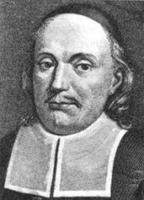 Paul Gerhardt was dubbed the "sweet singer of Lutheranism." He was born on 12 March 1607 in Gräfenhaim, near Wittenberg and lived during the religious wars of the 17th century. He received training as a Lutheran pastor at Wittenberg, where Martin Luther had taught a century before. However, Gerhardt didn't receive a call to a church until 1651, when he was ordained to serve the congregation in Mittenwalde, southeast of Berlin.
Paul Gerhardt was dubbed the "sweet singer of Lutheranism." He was born on 12 March 1607 in Gräfenhaim, near Wittenberg and lived during the religious wars of the 17th century. He received training as a Lutheran pastor at Wittenberg, where Martin Luther had taught a century before. However, Gerhardt didn't receive a call to a church until 1651, when he was ordained to serve the congregation in Mittenwalde, southeast of Berlin.While awaiting a call, he taught the children of Andreas Barthold — one of whom, Anna Maria, he later married. During that time he met Johann Crüger, the kantor and organist of Saint Nicholas Church, Berlin. Together they produced some of the greatest Lutheran chorales, including "Awake, My Heart with Gladness," (Auf, auf, mein Herz), "Now All the Woods Are Sleeping," and "All My Heart this Night Rejoices," among others.
Gerhardt's hymns combine a strong, objective faith in justification as a free gift from God with his own warm, subjective experience of that gift. In all, he wrote more than 120 hymns, many of which are still known and loved throughout the world.
His life, however, was difficult. He suffered greatly because of the religious wars. When asked to refrain from preaching against Calvinism by Elector Friedrich Wilhelm of Prussia, conscience would not allow him to compromise his Lutheran beliefs. He was soon deposed from office and barred from holding services even in his own home. During this time his wife and one son died, leaving him alone with a boy of six.
In May 1669, the congregation in Lübben, near the southeastern border of Germany, called him as pastor. He served there until his death on 27 May 1676. The Lübben congregation commissioned a life-sized painting of him for the church and in 1930, following renovation, the church was renamed Paul-Gerhardt-Kirche in his honor. The painting still hangs there. Beneath it is inscribed a fitting epitaph: "A theologian sifted in Satan's sieve."
Thank you to brother pastor and fellow blogger Charles Lehmann, who provided additional details on Nicolai's life and work.
Lection
Psalm 40
Deuteronomy 31:30-32:47
Colossians 3:12-17
John 16:16-24
Collect
Almighty God, through your holy apostle You taught us to praise You in psalms and hymns and spiritual songs; we give You thanks this day for the gift of hymn writing which confesses the Faith and inspires the faithful which You gave to Your servants Philipp Nicolai, Johann Heermann, and Paul Gerhardt, and we pray that Christ's Church may never lack those with the gifts of writing words and music to Your praise. May the Church be ever filled with the desire to praise and thank You for your grace, mercy, and faithfulness; through Jesus Christ, Your Son, our Lord, who lives and reigns with You and the Holy Spirit, one God, now and forever.
Technorati Tags: Philipp Nicolai | Johann Heermann | Paul Gerhard | Martin Luther | Johann Crüger | Johann Arndt | Pietism | confessional Lutheranism | orthodox Lutheranism | hymn writer | music | composition | cantor | kantor | hymnody | singing | hymns | chorales | church music | liturgics | organ | worship | history | Church Year | liturgical calendar | Christianity | orthodox Christianity | Christian | Christian | Lutheranism | Lutheran | Lutheran Confessions | festivals | saints' days | biography | hagiography | commemorations | lectionary | theology | practical theology | Church history | Christian history | German history | European history
These exemplary Christian women demonstrated their faith by their material support of Christ's Church.
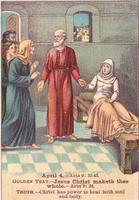 Dorcas (or "Tabitha" — both names meaning "gazelle") was well-known and much loved for her acts of charity in the city of Joppa, especially for her making clothes for the poor. When Dorcas died suddenly, the members of her congregation sent to the neighboring city of Lydda for the Apostle Peter, who came and raised her from the dead (Acts 9:36-43).
Dorcas (or "Tabitha" — both names meaning "gazelle") was well-known and much loved for her acts of charity in the city of Joppa, especially for her making clothes for the poor. When Dorcas died suddenly, the members of her congregation sent to the neighboring city of Lydda for the Apostle Peter, who came and raised her from the dead (Acts 9:36-43).Lydia was a woman of Thyatira, who worked at Philippi selling a famous purple dye that was so much in demand in the ancient world. She was also a "worshiper of God," although we cannot be sure if there was an active local she affiliated herself in any way with a local synagogue. When the Apostle Paul encountered her in prayer among other proselyte women, his preaching of the Word brought Lydia to faith in Christ. She and her friends thus became the nucleus of the Christian community in Philippi (16:11-15). It was to her house that Paul and Silas returned following the conversion of the Philippian jailer (16:16-40).
Phoebe was another faithful woman associated with the Apostle Paul. She was a church servant (perhaps "deaconess") from Cenchreae (one of the ports of Corinth) whom Paul sent to the church in Rome with his Epistle to the Romans. In it he writes of her support for the work of the early Church (Romans 16:1-2).
All of these women continue to be honored by the Church and emulated by many Christian women. Each of them, particularly Dorcas, have lent their names to various women's societies in many congregations.
Illustration is a public domain Bible card from 1897. To find similar cards and other illustrations, please follow the clipart link from The Bread Site.
Lection
Psalm 37:1-6 (27-40)
Acts 16:9-15 or 9:36-43
Romans 16:1-16
Matthew 10:40-42
Collect
Almighty God, You guided Your servants Dorcas, Lydia, and Phoebe to sustain and expand Your Holy Church by their loving service and generous deeds; open our hearts to hear You, grant us the will to obey You, and strengthen our hands to love our neighbors with the same love You pour out upon us, for the sake of Your Son Jesus Christ our Lord, who lives and reigns with You and the Holy Spirit, one God, now and forever.
Technorati Tags: Dorcas | Tabitha | gazelle | Lydia | Phoebe | St. Paul | Saint Paul | Apostle Paul | St. Peter | Saint Peter | Apostle Peter | Silas | women | woman | Acts | Church Year | liturgical calendar | sanctorial calendar | Christianity | Christian | Lutheran | Lutheranism | Christian feasts | festivals | saints' days | biography | hagiography | commemoration | theology | historical theology | exegetical theology | history | Church history | Christian history | Bible history | biblical history | Bible | Scripture | New Testament | Aardvark Alley
 The New Testament refers to this James as the brother of Jesus (Galatians 1:19). He led the Christian congregation in Jerusalem for many years, garnering the title "Bishop of Jerusalem" among many in Christendom. He is often credited with authorship of the Epistle of James, although the Epistle itself does not state this explicitly.
The New Testament refers to this James as the brother of Jesus (Galatians 1:19). He led the Christian congregation in Jerusalem for many years, garnering the title "Bishop of Jerusalem" among many in Christendom. He is often credited with authorship of the Epistle of James, although the Epistle itself does not state this explicitly.James is mentioned briefly in connection with Jesus' visit to Nazareth (Matthew 13:55; Mark 6:3). John 7:2-5 tells us that Jesus' brothers did not believe in Him and from this, as well as references in early Christian writers, we infer that James was not a disciple of the Lord until after the Resurrection. When Paul lists our Lord's resurrection appearances (1 Corinthians 15:3-8), he includes an appearance to James. Peter, about to leave Jerusalem after escaping from Herod, left a message for James and the Apostles (Acts 12:17). When a council met at Jerusalem to consider what rules Gentile Christians should be required to keep, James formulated the final consensus (Acts 15:13-21).
On his last recorded visit to Jerusalem, Paul visited James (others were present, but no other names are given) and spoke of his ministry to the Gentiles (Acts 21:18).
Outside the New Testament, the Jewish historian Josephus called James "the brother of Jesus the so-called Christ," and reported that even the Pharisees greatly respected his piety and strict observance of the Law but that his enemies took advantage of an interval between Roman governors in AD 62 to have him put to death. Numerous references in early Christian documents also show the esteem with which the early Church held him.
While debate continues, this particular James is likely the one called "James the Just" (or "James the Righteous") by much of the Church. The source of this appellation seems to come from an early tradition that James took vows as a Nazarite and that his life, both in Judaism and after conversion to the Faith, was marked by deep piety.
For a bit more on James' possible blood relationship to Jesus, see the Ask the Pastor post the Names of Jesus' Brothers. An explanation in the hagiography for Saint Philip and Saint James, Apostles helps discern among the different New Testament people sharing this name.
Lection
Psalm 133
Acts 15:12-22a
James 1:1-12
Matthew 13:54-58
Collect
Heavenly Father, shepherd of Your people, You raised up James the Just to lead and guide Christ's Church in her early days. Grant that we may follow his example of prayer and reconciliation and be strengthened by the witness of his death; through Jesus Christ, Your Son, our Lord, who lives and reigns with You and the Holy Spirit, one God, now and forever.
Technorati Tags: Saint James of Jerusalem | Saint James | St. James | James | James the Just | James the Righteous | Jesus | Jesus Christ | Christ | Saint Paul | Josephus | Bishop of Jerusalem | brother of Jesus | brother of the Lord | Jesus' family | Jesus' brothers | Epistle | Epistle of James | martyr | martyrdom | Jerusalem | Nazarite | Church Year | liturgical calendar | sanctorial calendar | Christianity | Christian | Lutheran | Lutheranism | Christian feasts | festivals | saints' days | biography | hagiography | commemoration | theology | historical theology | exegetical theology | history | Church history | Christian history | Bible history | biblical history | Bible | Scripture | New Testament | Aardvark Alley
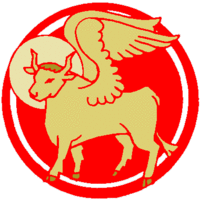 Saint Luke the Evangelist was a physician (Colossians 4:14) and a companion of St. Paul on some of his missionary journeys (see Acts 16:10ff; 20:5ff; 27-28).
Saint Luke the Evangelist was a physician (Colossians 4:14) and a companion of St. Paul on some of his missionary journeys (see Acts 16:10ff; 20:5ff; 27-28).Material found in his Gospel account and not elsewhere includes the Annunciation and almost all we know of Jesus' birth, infancy, and boyhood. He recounts some of the most moving parables, including the Good Samaritan and the Prodigal Son. He also provides three of the sayings of Christ on the Cross: "Father, forgive them, (23:34)" "Today, you will be with me in Paradise, (23:43)" and "Father, into your hands I commit my spirit! (23:46)"
Luke's Gospel account emphasizes the human love of Christ, His compassion for sinners and for suffering and unhappy persons, for outcasts such as the Samaritans, tax collectors, lepers, shepherds (not a respected profession), and for the poor. Christ's treatment of women and their important supporting role in His ministry is also emphasized in Luke more than in the other Gospels.
Much of Christianity uses each of the four living creatures (see Ezekiel 1 and Revelation 4) as a symbol one of the four evangelists. While attributions vary in parts of Christendom, most of the Western Church assigns the winged ox to Saint Luke. The association probably comes because the ox was one of the major sacrificial animals under the Old Covenant while Luke strongly highlighted the sacrificial elements of Christ's life, suffering, and death. See the commemoration of Saint Matthew for details of the other evangelists' symbols in ecclesiastical art.
Lection
Psalm 147:1-11
Isaiah 35:5-8
2 Timothy 4:5-18
Luke 10:1-9
Collect
Almighty God, our Father, Your blessed Son called Luke the physician to be an evangelist and physician of the soul. Grant that the healing medicine of the Gospel and the Sacraments may put to flight the diseases of our souls that with willing hearts we may ever love and serve You; through Jesus Christ, Your Son, our Lord, who lives and reigns with You and the Holy Spirit, one God, now and forever.
Scripture quoted from The Holy Bible, English Standard Version™, © 2001 by Crossway Bibles.
Technorati Tags: Saint Luke the Evangelist | Saint Luke | St. Luke | Luke | Saint Paul | physician | evangelist | Church Year | liturgical calendar | sanctorial calendar | Christianity | Christian | Lutheran | Lutheranism | Christian feasts | festivals | saints' days | biography | hagiography | commemoration | theology | historical theology | exegetical theology | Church history | Bible history | biblical history | Bible | Scripture | New Testament | Gospel | Gospels | Evangel | Good News | ox | winged ox | four living creatures | ecclesiastical art | Christian symbol | symbolism | Aardvark Alley
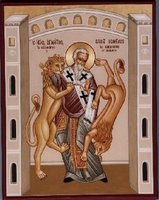 St. Ignatius, Pastor and Martyr, was the bishop of Antioch in Syria at the beginning of the second century AD and an early Christian martyr. Near the end of the reign of the Roman emperor Trajan (98-117), Ignatius was arrested, taken in chains to Rome, and eventually thrown to the wild beasts in the arena.
St. Ignatius, Pastor and Martyr, was the bishop of Antioch in Syria at the beginning of the second century AD and an early Christian martyr. Near the end of the reign of the Roman emperor Trajan (98-117), Ignatius was arrested, taken in chains to Rome, and eventually thrown to the wild beasts in the arena.On the way to Rome, he wrote letters to the Christians at Ephesus, Magnesia, Tralles, Rome, Philadelphia, and Smyrna, and also to Polycarp, bishop of Smyrna. In the letters, which are beautifully pastoral in tone, Ignatius warned against certain heresies (false teachings). He also repeatedly stressed the full humanity and deity of Christ, the reality of Christ's bodily presence in the Lord's Supper, the supreme authority of the bishop, and the unity of the Church found in her bishops.
Ignatius was the first to use the word catholic to describe the universality of the Church. His Christ-centeredness, his courage in the face of martyrdom, and his zeal for the truth over against false doctrine remain his lasting legacy to the Church.
Lection
Psalm 116:1-8 or 31:1-5
Romans 8:35-39
John 12:23-26
Collect
Almighty God, we praise you for your bishop and martyr Ignatius of Antioch, who offered himself as grain to be ground by the teeth of wild beasts that he might present to you the pure bread of sacrifice. Accept the willing tribute of our lives, and give us a share in the pure and spotless offering of your Son Jesus Christ; who lives and reigns with you and the Holy Spirit, one God, now and forever.
Technorati Tags: Saint Ignatius of Antioch | Saint Ignatius | St. Ignatius | Ignatius of Antioch | Trajan | Polycarp | Antioch | Rome | martyr | martyrdom | Church Year | liturgical calendar | false doctrine | heresy | Christianity | orthodox Christianity | Christian | Lutheranism | Lutheran | festivals | saints' days | Scripture | Bible | biography | hagiography | commemorations | lectionary | Christology | Lord's Supper | Real Presence | sacramental theology | Eucharistic theology | church polity | practical theology | theology | systematic theology | history | historical theology | Church history | Christian history | Syrian history | Middle Eastern history | European history | Roman history| Aardvark Alley
A previous post that's since been parked addressed rumors surrounding the alleged demise of the Concordia Publishing House book Women Pastors? The Ordination of Women in a Biblical, Lutheran Perspective by Matthew C. Harrison and John T. Pless. After laying out crisscrossing and conflicting reports, I wrote, "Avoid extremes, weigh the evidence, and don't believe a radical departure from the norm it until you can prove it."
I noted that it would take solid evidence to believe such radical conspiracy theories. Of course, the only solid evidence was to the contrary. In actuality, the book remains in the CPH inventory but sold out its first two printings. It's now being readied for a third print run in a second edition. It remains indisputable that most of the copies have been gobbled up, so any other procrastinators may not be able to obtain the book until the new edition is made available.
Regarding the now-vamoosed previous post, I listed as "true" the fact that gossip was flying and summarized its content. I never endorsed this content as "truth" and, as noted above, promoted a wait-and-see attitude. I was happy to receive bona fide notification that these rumors were false. However, I removed said post because some people, even after I provided brightly marked addenda (roughly equivalent to twenty seven eight-by-ten colour glossy pictures with the circles and arrows and a paragraph on the back of each one explaining what each one was), mistook the factual reporting of the content of the rumors for my approval of them. Well, they can rest easy now. The litany of speculations has vanished. Thus, yesterday's breaking news was made into today's broken news and now we can guarantee peace for our time.
Of course, we could start another conspiracy theory (and please, oh, please read this as tongue-in-cheek): If a publishers truly wanted to spur sales of particular titles and had little regard for ethics, might they not spread stories of the books' impending demise due to Orwellian forces at work so as to stimulate a buy and hoard response?
Sadly, a real world parallel has existed for years, wherein lies are disseminated in order to manipulate stock prices. Even in the midst of our general fiscal crisis, there remain those who'll tempt fate (and SEC audits) in order to make a few more bucks by playing to others' fears through illegal means. So dare we ask, "How many of yesterday's 75 swings in the Dow Jones Average based upon panic, how many on savvy investment strategies, and how many because someone was lying through his teeth (or keyboard)?"
And they all lived happily ever after. The end.
Technorati Tags: Women Pastors? | Matthew C. Harrison | John T. Pless | ordination of women | women's ordination | essays | Concordia Publishing House | CPH | LCMS | Lutheran Church — Missouri Synod | doctrinal review | Bible | Christianity | Christian | Lutheran | Lutheranism | doctrine | theology | confessional Lutheran | Aardvark Alley
P.S. If even extensive therapy, meditation, or medication, cannot occasionally bring you to an appreciation of viewing life from my perspective, I'm not holding your attention span hostage. You can always bail on the Alley and instead read the latest comedy from Joel Osteen or the psycho-social insights of Zippy the Pinhead.

